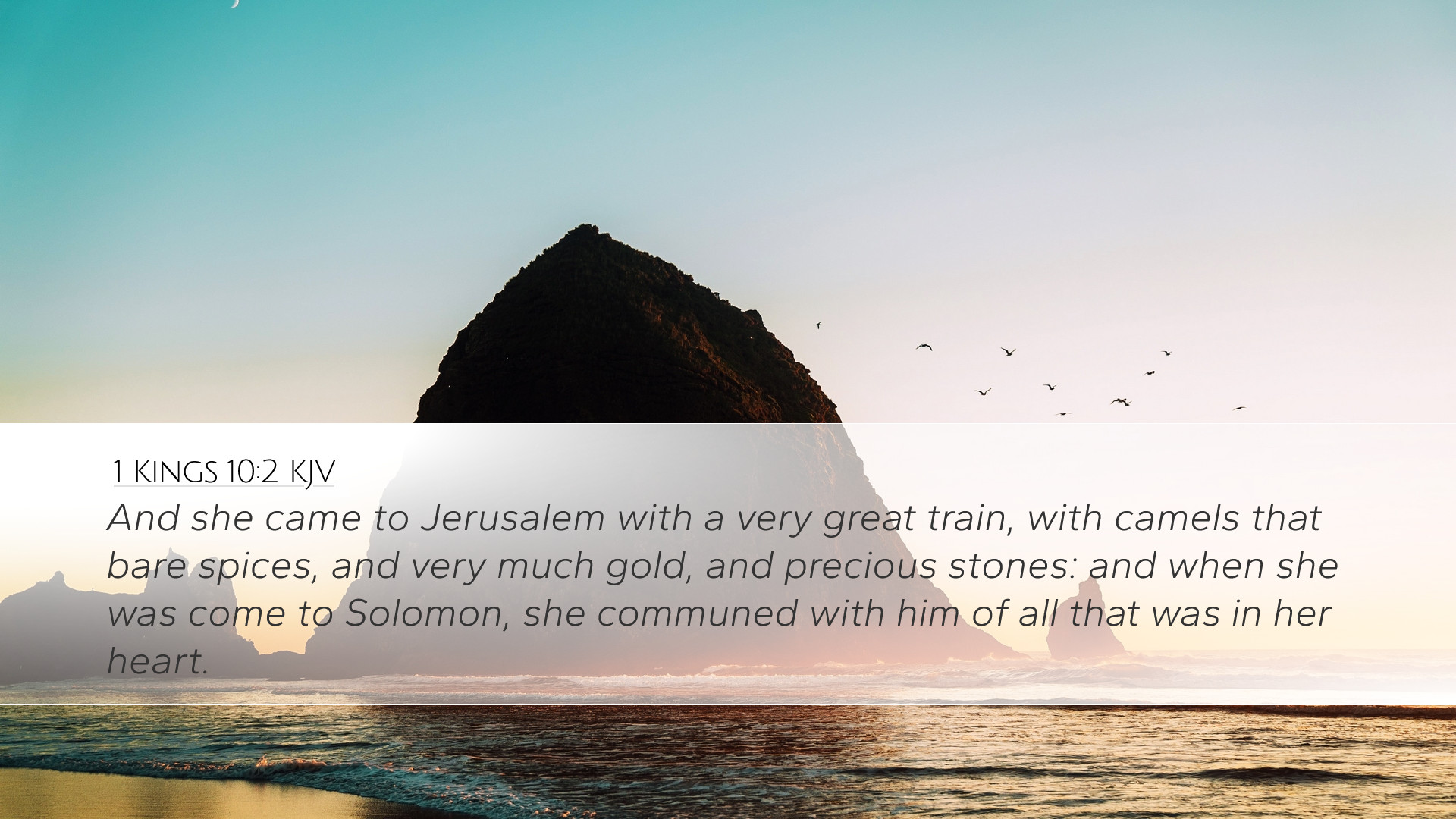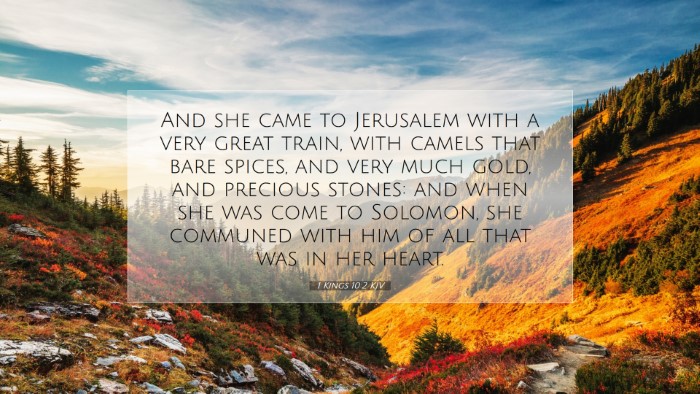Commentary on 1 Kings 10:2
Verse Reference: 1 Kings 10:2 - "And she came to Jerusalem with a very great train, with camels that bore spices, and very much gold, and precious stones: and when she was come to Solomon, she communed with him of all that was in her heart."
Introduction
This notable verse describes the visit of the Queen of Sheba to King Solomon, representing a pivotal moment in Israel's history, showcasing the wisdom and wealth of Solomon, and the international recognition that comes with it. It is crucial for pastors, theologians, and scholars to reflect on the implications of this encounter in the broader context of divine wisdom, the search for truth, and the nature of regal splendor.
The Queen's Journey
The journey of the Queen of Sheba to Jerusalem speaks volumes about her character and motivations. Matthew Henry notes that her coming signifies a search for wisdom and understanding— "she did not appear before Solomon with empty hands; she came with a great train." This description highlights both her status and her determination. Traveling from a distant land, possibly modern-day Ethiopia or Yemen, her desire to seek truth and wisdom prompts her long journey.
The Significance of the Gifts
According to Albert Barnes, the items brought by the Queen— "spices, gold, and precious stones"— serve multiple purposes: they are not only tokens of honor but also indicative of the wealth and trade of her own kingdom. The richness of these gifts symbolizes the acknowledgment of Solomon’s vast wealth and wisdom. Gifts in ancient cultures often represented the seriousness of one’s request or inquiry, underscoring the queen's earnestness in seeking knowledge.
Communing with Solomon
The phrase "she communed with him of all that was in her heart" is particularly poignant. Adam Clarke emphasizes the personal nature of this dialogue, suggesting that the queen's inquiries may have ranged from geopolitical concerns to philosophical questions—reflecting a deep yearning for understanding. This meeting symbolizes the unifying power of wisdom, whereby one monarch seeks counsel from another whose reputation for sagacity has reached far and wide. Touching upon the theme of divine wisdom, Clarke remarks that the wisdom of Solomon was not merely native intelligence but a gift from God, sought earnestly through prayer.
The Impact of Her Visit
This exchange is significant for several reasons:
- A Symbol of Global Recognition: The visit illustrates that Solomon’s fame for wisdom and prosperity had transcended Israel, impacting surrounding nations and rulers.
- Foreshadowing Greater Revelations: The Queen of Sheba’s visit foreshadows the coming of Gentiles who would seek the light of Israel—the implications resonating throughout the New Testament.
- A Lesson on Humility: Her willingness to travel a long distance to meet Solomon serves as a lesson in humility and the acknowledgment of one's need for guidance and wisdom.
Theological Considerations
At its core, this passage reveals the profound and eternal truth regarding the thirst for wisdom and divine interpretation. Here are key theological implications:
- God’s Sovereignty: The riches and wisdom of Solomon were rooted in the covenantal promises of God to Israel, affirming God’s sovereignty over nations.
- The Nature of True Wisdom: It is not merely intellectual but relational; it invites dialogue and communion, as evidenced by the queen’s conversation with Solomon.
- Anticipation of Christ: Just as the Queen sought Solomon, so does the world seek the true King—the ultimate source of wisdom, foreshadowed in Christ. The New Testament parallels in Matthew 12:42, where Jesus refers to the Queen's visit, further solidify this expectation.
Concluding Thoughts
As the narrative unfolds in 1 Kings 10:2, it is more than a mere historical account; it serves as a profound invitation for each reader or hearer of the Word to ponder their quest for wisdom. The Queen of Sheba's example stands as a testament to the virtue of seeking insight and understanding, especially from Godly sources. Henry astutely points out that wisdom is to be sought out; it comes to those who earnestly desire it, assuring us that God offers wisdom generously to those who ask for it (James 1:5).
Reflection Questions
For personal or ministerial reflection, consider the following:
- What are the "great trains" we bring to God in our search for wisdom?
- In what ways do we communicate the desires of our hearts to God, akin to the Queen's communion with Solomon?
- How can the church emulate the spirit of inquiry and attentiveness demonstrated by the Queen of Sheba in seeking divine wisdom?
Final Prayer
Heavenly Father, grant us the humility to seek after wisdom as the Queen of Sheba sought Solomon, and may we find in Your Word the treasures of knowledge that lead us closer to You. Amen.


